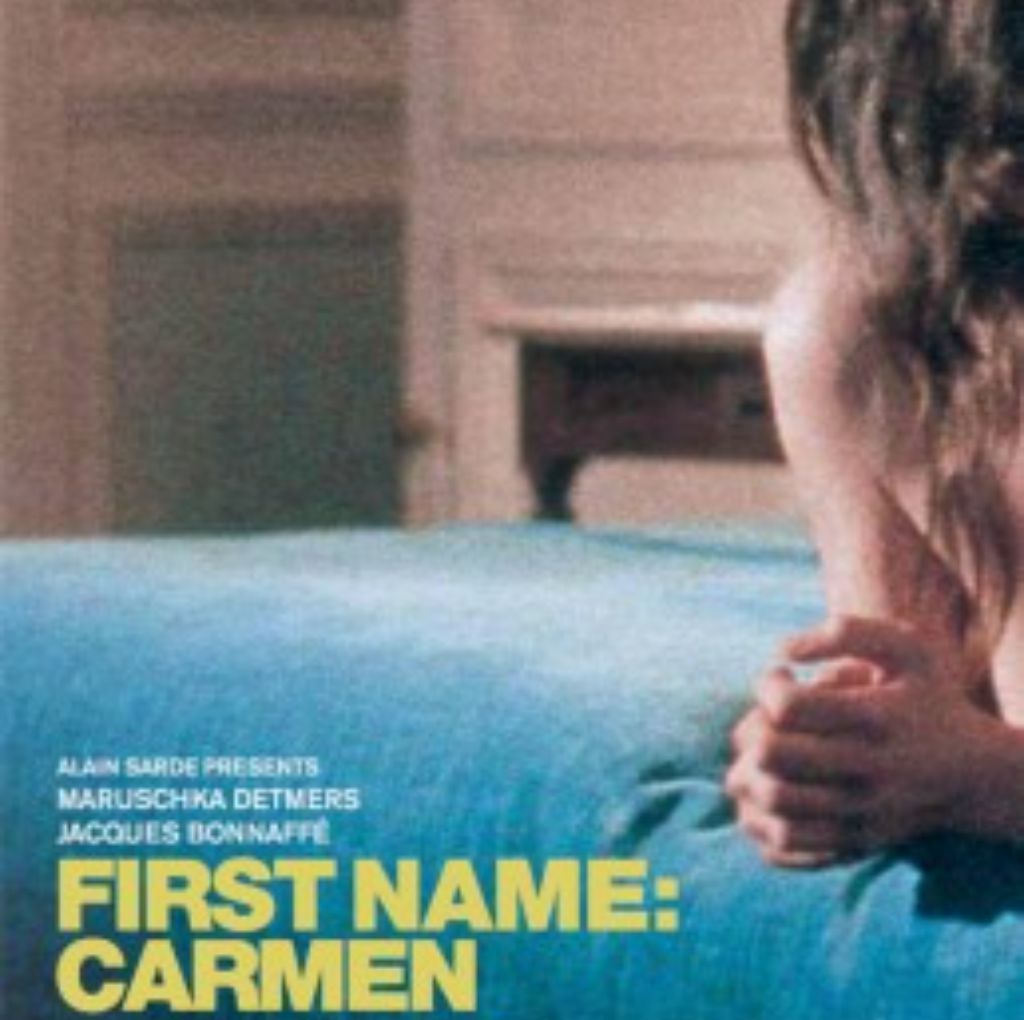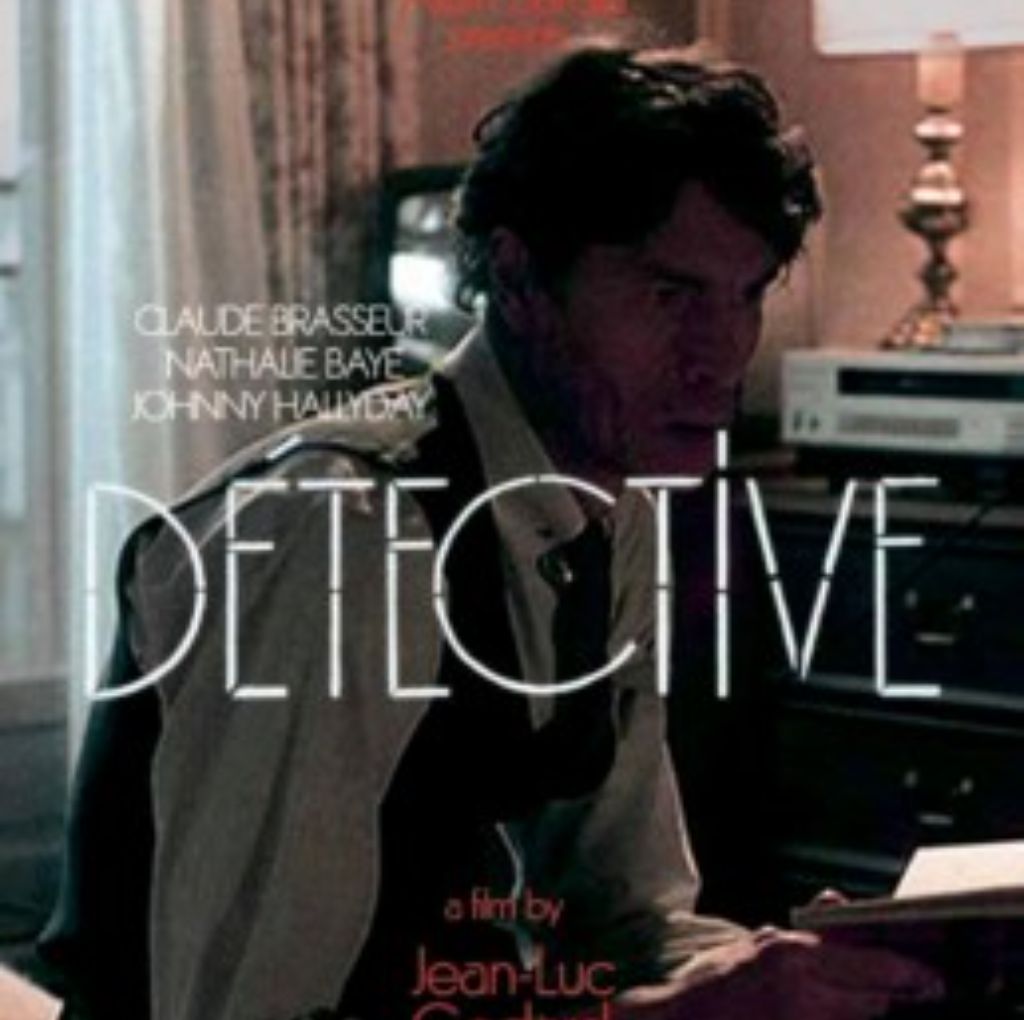Experience cinematic magic with the Round-Up film—captivating storytelling and visual splendor await in every frame.
The typical narrative surrounding Jean-Luc Godard asserts that he has never come close to replicating the string of masterpieces he created during his remarkably prolific 1960s output.
The 1970s witnessed militantly political works that challenged audiences to find any semblance of “entertainment,” while the subsequent decades featured a series of whimsically experimental essay films.
While labeling the ’80s and early ’90s as a lost era for Godard may be a stretch, there needs to be more appreciation for his return to narrative filmmaking, uniquely envisioned by Godard.
Kino’s upgrade of three of four films from Lionsgate’s DVD box set provides an excellent opportunity to rediscover three pivotal works from this period.
Godard distorts myth and genre in each film, dismantling conventional notions of storytelling and engaging in a dialogue with some of his earlier works, particularly Détective and First Name: Carmen.
First Name: Carmen (1982) Détective (1985) Hélas Pour Moi (1993) Kino Lorber
First Name: Carmen explores the filmmaker’s persona, with Godard portraying a version of himself deemed “washed up,” vexing hospital staff for no apparent reason.
His niece Carmen, played by Maruschka Detmers, persuades “Uncle Jean” to lend her his house for a film she claims to be making.

However, it is a front for several poorly conceived robbery and kidnapping schemes.
Reimagining Bizet’s opera, Godard transforms the tale of passion and doom into a narrative dominated by doom alone.
Carmen’s affair with security guard Joseph (Jacques Bonaffé) is marked by disconnection from the outset, even as he attempts to prevent her from robbing a bank by tying himself to her.
First Name: Carmen is artfully meta, with Godard puncturing traditional cinematic pleasures.
The film skillfully weaves a captivating story of loss within a playful and unconventional structure, making it a standout work.
The other two films don’t quite reach the same heights, especially Détective, which remains a disjointed genre experiment with its dual narrative about detectives (Jean-Pierre Léaud and Laurent Terzieff).

Further, solving a murder and an evil boxing trainer (Johnny Hallyday) navigating debts in the same hotel.
While less self-reflexive than First Name: Carmen, the film still feels overtly artificial, with convoluted plot twists competing to create the most complex noir story ever.
In Hélas Pour Moi, Godard reinterprets the Greek myth of Alcmene and Amphitryon as a sad reflection on humanity.
Depicting a god inhabiting the body of Simon (Gérard Depardieu) to experience sensual pleasure with Rachel (Laurence Masliah).
Moreover, the film shot with an unusual stillness by cinematographer Caroline Champetier, raises questions about the authenticity of the relationship.
After Depardieu’s departure mid-production, Godard introduces a frame story involving a publisher (Bernard Verley) reconstructing the Simon and Rachel narrative.
Despite the film’s ambiguity, the mystical aura of the Simon and Rachel flashbacks stands out, while the present-day scenes with the publisher are firmly rooted in earthly struggles.
Helas Pour MoiAll three Kino discs feature a 1080p, 1.37:1 transfer, significantly improving over the previous DVD set.
Clarity and fine detail are remarkable in all three transfers, with Hélas Pour Moi standing out as Godard’s most visually stunning film.

The transfers are film-like, showcasing perfectly rendered grain and vibrant colors. Although some light speckling occurs, particularly in Carmen, it’s hard to imagine these films looking better in this format.
The DTS-HD Master Audio 2.0 tracks (mono on Carmen, stereo on the others) consistently deliver excellent sound quality, providing a clean platform for various auditory nuances.
Each disc includes an audio commentary and a booklet essay, with Carmen also featuring Godard’s 1982 short film Changer d’image.
Relaxer (2018) Oscilloscope Laboratories
Joel Potrykus’ latest film unequivocally attests to his prowess in crafting worlds that authentically embody a lived-in sense of squalor.
There’s no hint of artful arrangement or faux-squalor.
From the dreadful mortgage office in “Buzzard” (2014) to the eerie cabin in “The Alchemist’s Cookbook” (2016) to the decaying apartment in “Relaxer,” the settings are consistently uncomfortably natural.
These settings serve as fertile grounds for Potrykus’ twisted fantasies and their reflections on toxic masculinity.
In “Relaxer,” the deterioration of the film’s sole location is a hilariously grotesque salute to end-of-millennium American culture.

Set in a warped version of 1999, with the looming Y2K apocalypse, Potrykus greets it with a blast of ’90s anti-nostalgia.
Joshua Burge, who delivered uproarious and troubling levels of impotent rage in “Buzzard” and Potrykus’ debut feature, “Ape” (2012), gives his finest performance as Abbie in “Relaxer.”
Abbie is a pathologically committed individual, determined to complete any challenge and endure any abuse from his older brother, Cam (David Dastmalchian).
The challenges range from drinking nearly a whole gallon of milk to the ultimate task: beating the nigh-mythical Level 256 on Pac-Man without leaving the couch until it’s accomplished.
“Relaxer” feels like the culmination of Potrykus’ films, pushing the slacker ideal to its breaking point and reveling in the grotesque like never before.
With spilled sour milk, guzzled cherry Faygo, and increasingly disgusting fluids, the film possesses a sticky tactility that leaves a lasting impression.
Potrykus transforms a bit of Bunuel’s “The Exterminating Angel” into a scatological nightmare and reimagines Chaplin eating his shoe in “The Gold Rush” as a cringe-inducing grace note.
Burge, resembling Buster Keaton, essentially becomes a silent film star by the film’s end, with every gesture performed by Abbie’s atrophied body focused on one quixotic goal.
It isn’t comforting, unexpectedly funny, and embodies the quintessence of a Joel Potrykus film.
Oscilloscope’s Blu-ray features a 1080p, 1.85:1 transfer with exceptional clarity and faithful reproduction of the film’s generally muted look.
The stereo DTS-HD Master Audio track is dynamic and lively, complementing the film’s various elements.
Extras include a Potrykus audio commentary, behind-the-scenes footage, rehearsal footage with Potrykus and Burge, promos, and a unique viewer challenge: 2001-era footage of Potrykus and friends puking at a “milk party.”
One Sings, the Other Doesn’t (1977) The Criterion Collection
The feminist films of Agnès Varda take many shapes, but whether she was working in a mode of documentary realism or sunnily lacerating satire, she never had time for sentimentality.
That’s especially apparent in One Sings, the Other Doesn’t, which treats both the separation of its main characters and their fight for abortion rights in Europe as perfectly surmountable obstacles.

When the women in Varda’s sort-of-musical face a problem — sudden abandonment by romantic partners, friendship-testing distances, political resistance — they do what needs to be done to get past it.
That matter-of-factness can make One Sing, the Other Doesn’t resonate somewhat less than more formally playful Varda films, but the film’s depiction of female friendship is undeniably moving.
Teenaged Pauline (Valérie Mairesse) reconnects with Suzanne (Thérèse Liotard), an older friend whose pregnancy has put her in dire straits.
Pauline helps come up with the money to pay for an abortion, and a loose bond becomes an unbreakable connection, even as circumstances keep the two apart for a decade.
When they reunite, each has deepened their involvement in the feminist cause: Pauline now goes by Pomme and performs with a political all-women band, while Suzanne has opened a family planning clinic.
There’s a fundamental optimism to One Sing; the Other Doesn’t and its affirmation of feminism as liberation for women of all walks of life. Its generosity and openness are lovely.
Criterion’s 1080p, 1.66:1 transfer is sourced from a 2K restoration of the original camera negative.
The image occasionally leans into the teal zone, with some slightly unnatural cold hues, but image clarity, fine detail, and grain resolution are excellent.
Further, the same restoration is featured on the Artificial Eye Region B Blu-ray set, and the transfers look identical.
Extras include Katja Raganelli’s on-set documentary and two Varda shorts: Réponse de femmes and Plaisir d’amour en Iran, which briefly expounds on an underdeveloped thread in One Sings.
Also included: a trailer, an insert with an essay by Amy Taubin and notes from Varda, and a separate booklet that recreates sections of the 1977 press book.
A Case for a Rookie Hangman (1969) Second Run
In the final film of his regrettably short career, Czech director Pavel Juráček, “A Case for a Rookie Hangman,” reads like a manual on provoking an authoritarian regime.
A move that backfired as the film remained largely unreleased, leading to Juráček’s industry blackballing.
Loosely adapting a segment from Jonathan Swift’s Gulliver’s Travels, Juráček immerses a less-than-heroic Gulliver (Lubomír Kostelka) into a series of impossible conflicts within the kingdom of Balnibarbi and the floating island of Laputa.

The government is rigid, and the populace is ready to erupt into an angry mob. Gulliver struggles to convince anyone that he’s not Oscar, a rabbit in clothing—an homage to Carroll—that he accidentally ran over.
Juráček’s fluid storytelling is complemented by chapter headings and the emotional turmoil of Gulliver, haunted by visions of a drowned love.
Kostelka’s performance conveys a dazed anguish, visualized by Juráček through clever shots, notably one where a house’s floorboards morph into elasticity.
Second Run’s Blu-ray, sourced from the Czech Film Archive’s 4K restoration, boasts a pleasing 1080p, 1.37:1 transfer with fine detail, solid grayscale, and intentional reel change marks.
The 2.0 LPCM mono track is notably clean.
The extras nearly constitute a “Complete Directed Works of Juráček” set, missing only his debut feature, “Every Young Man” (1966).
Included are two shorts, “Cars Without a Home” and “Black and White Sylva,” along with the short feature “Josef Kilián” (1963), an absurdist piece about returning a borrowed cat.
An episode of the Projection Booth podcast serves as an audio commentary, and Michael Brooke’s booklet essay delves into the film and Juráček’s brief career.
All About Lily Chou-Chou (2001) Film Movement
Few films about youth capture honesty as profoundly as Shunji Iwai’s “All About Lily Chou-Chou,” where teenagers’ unfiltered exuberance and unexpectedly cruel tendencies intertwine.
Serving as a chronicle of the early Internet era, the film explores how obsessions were collectively intensified as characters unite around their adoration for singer Lily Chou-Chou.
Visualizing an online forum, the movie depicts rapid-fire comments and usernames flooding the screen, many venerating Lily and the “Ether,” the creative aura attributed to her art by fans.

In the offline realm, Iwai maintains a similar ethereal ambiance, employing weightless camera work and Lily’s otherworldly music (crafted by Takeshi Kobayashi and Salyu) to enhance the dreamlike atmosphere.
However, the realities here are much darker, with friends Shūsuke (Shugo Oshinari) and Yūichi (Hayato Ichihara) experiencing a fallout involving the formation of a gang and a prostitution ring.
The ensuing violence and brutality are shocking, yet the film never forsakes its dreamy quality.
Iwai frequently revisits a grassy field where a character, lost in Lily’s music through headphones, drifts away.
Music serves as a genuine balm, but its efficacy has limits, as does a community centered around a common interest, as illustrated by the film’s impactful final sequence.
Film Movement’s Blu-ray features a 1080p, 1.78:1 transfer constrained by the source material, primarily shot on the then-new Sony HDW-F900 digital camera.
The film’s vibrant colors remain primarily accurate, with solid detail in favorable lighting conditions.
Expected macro blocking is minimal, except for a few moments during the Okinawa segment, where a change in viewpoint results in smeared, degraded images.
The 5.1 DTS-HD Master Audio soundtrack is dynamic, providing an excellent platform for the film’s music.
Extras include an oddly labeled “making-of featurette,” which is an 86-minute documentary covering the film’s online origins and production.
The accompanying booklet includes a director’s statement and an essay by Stephen Cremin.

